Welsh rugby: Call to end 'cosy relationship' with beer
- Published
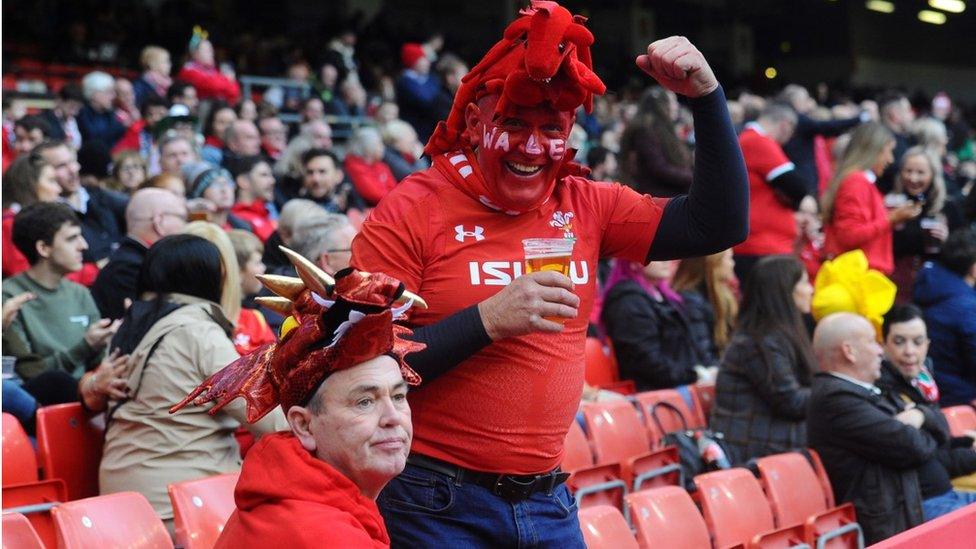
Most drink responsibly - but is there a problem with a minority drinking to excess?
Pitch invaders versus both New Zealand and South Africa; a boy given £20 after having beer spilled on him in the Fiji match; a young fan vomited over while watching Australia.
This season's four Wales rugby autumn internationals have made headlines for the wrong reasons as much as they have for the games themselves.
It has led Cardiff's Principality Stadium to be branded "the world's biggest pub" by journalist Peter Jackson.
But how serious is the drinking issue in rugby?
Liver specialist Dr Dai Samuel said "the halo of rugby has well and truly slipped this autumn", while the Institute of Alcohol Studies, external (IAS) called for an end to the "cosy relationship" between alcohol and rugby.
"The normalisation of heavy drinking in relation to sport is at odds with the health benefits of participating in sport," said IAS head of research Dr Sadie Boniface.
Former Wales second row Ian Gough said most fans just wanted a "social beer" at games, and will drink responsibly. But he urged a clampdown on the "loose cannons" in groups who went "over the top".

Joey's mother wants people to be more aware of children at rugby matches
The latest incident, in Saturday's victory over Australia, saw a six-year-old left "in floods of tears" after he was vomited on.
Joey's mother Sophie Delaney, from Chepstow, Monmouthshire, said the sick was "all over the back of him, his coat, over me and on the floor", with the perpetrator too drunk to even acknowledge it.

After more than a year of no fans because of Covid, they have returned to the stadium in their droves
The Welsh Rugby Union said it "was sorry to hear about the family's experience".
"In excess of 275,000 fans have attended the autumn nations series games and the vast majority of fans enjoy themselves in a responsible and considerate way," a spokesman said.
"It is policy for our staff to intervene if people are visibly intoxicated - this happens in three main areas: The turnstiles where people can be denied entry, at the point of sale if they try and buy alcohol, and in the stadium bowl."
Reports of alcohol-related issues date back a number of years and in autumn 2017, Supt Mark Cleland of British Transport Police, external, said: "Always a disappointment to review the post-incident crime and see that yet again rugby fans were worse than football fans in Cardiff this weekend with their post-Wales v New Zealand drunken violent behaviour."
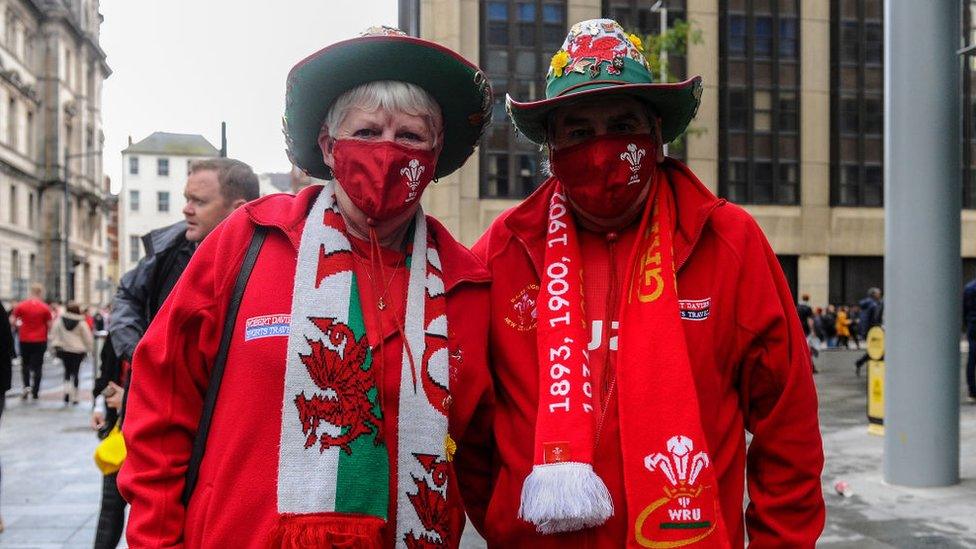
Rules have been in place, such as masks in the stadium concourses and supporters in their seats by a certain time before kick-off
In football, alcohol cannot be sold within sight of the ground, external 15 minutes before or after the game.
"I wonder why we haven't extended the alcohol ban to all sporting grounds?" asked IAS policy officer, external Habib Kadiri.
"Perhaps it is because no other sports have attained football's notoriety. But why risk it?"
Dr Samuel, of the Royal Glamorgan Hospital, Llantrisant, said: "If we think rugby union fans are above football fans then I think you have to have a hard look at the mirror because people don't behave like this in general any more and if you can't go without a pint for 40 minutes there clearly is something wrong."
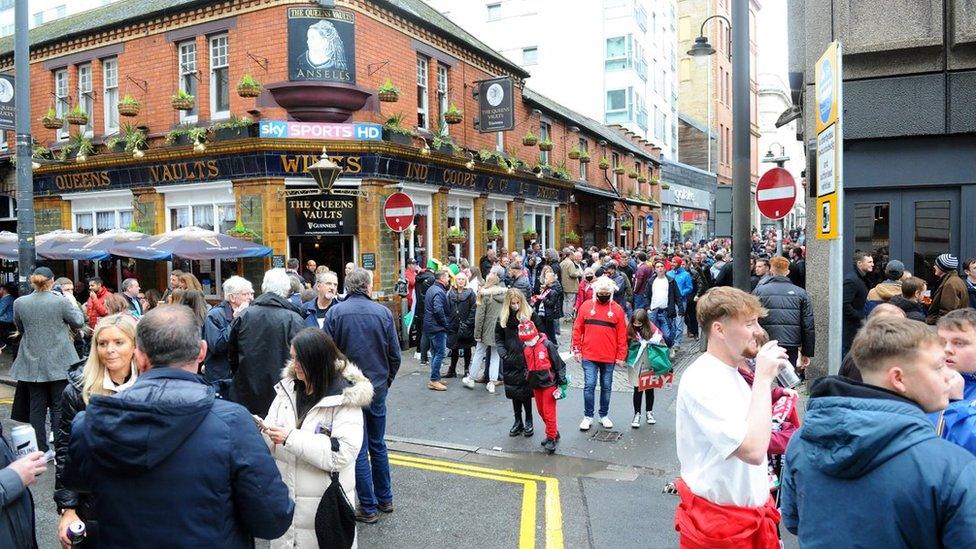
The Principality Stadium is within a stone's throw of Cardiff pubs
Describing the Principality Stadium as "unique", he said its city centre location meant fans could go straight from the pub to their seat and start drinking again.
"It's worrying that the whole atmosphere and concept of what an international match means now heavily involves alcohol and very often doesn't involve enjoying a game of rugby," he said on BBC Radio Wales.
Incidents in Cardiff include a disabled fan being abused during the Wales-New Zealand game in November 2017. A year later, the WRU introduced an alcohol-free zone, with 4,200 dry seats.
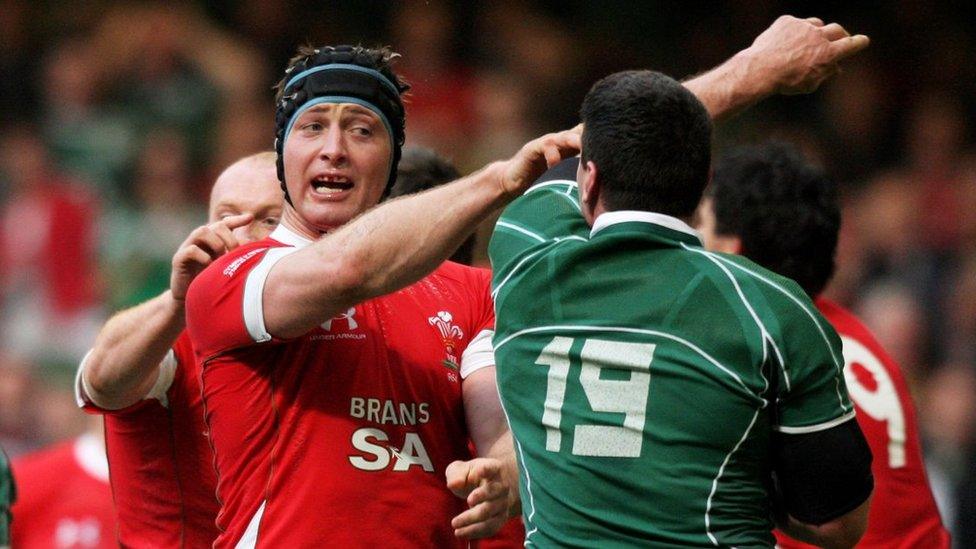
Former Ospreys and Newport second row Ian Gough played at the stadium many times during his career
Gough, who won 64 caps for Wales, said such provisions were important to segregate "families from the groups of partying lads", describing Saturday's incident as "horrific".
"I take my children to games and you don't expect or want that to happen," he told BBC Radio Wales.
"I remember as a 15, 16-year-old going to the East Terrace in the old stadium and being weed on and that wasn't a nice experience.
"It's something that does need to be addressed but again it needs to be a balance - if someone is too drunk then they're told they have to leave."
He wants stronger enforcement against those drinking to excess, saying "a lot of people would be very opposed" to not being able to enjoy a match day pint.
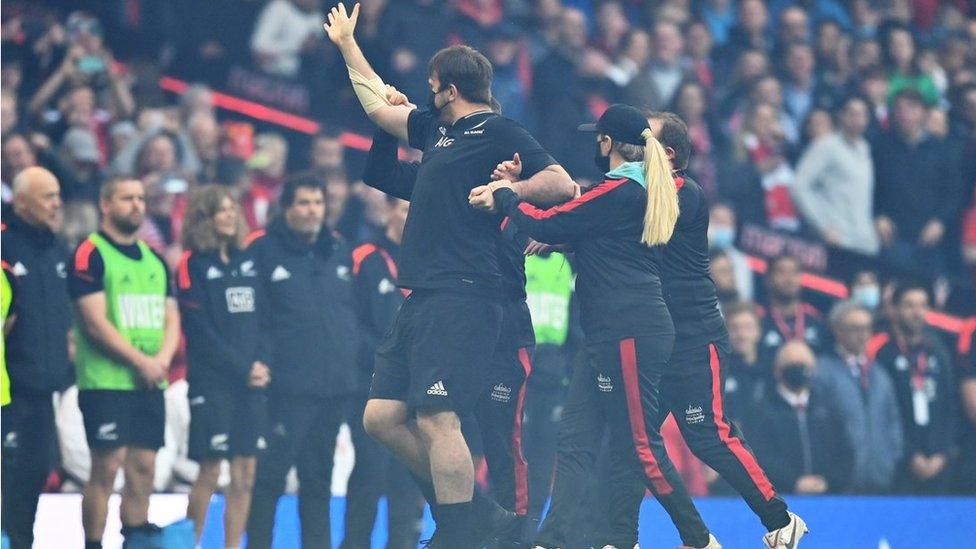
The pitch invader is escorted off the pitch before the Wales versus New Zealand match
This season, a man dressed in a New Zealand kit was able to get on to the turf and join the team's line-up for the anthem.
Then, against South Africa, a spectator was tackled by stewards after running on to the pitch, and was later given a community resolution by police.
For the Fiji match, a man described how supporters spilled beer, external all over his son.
However, as they were leaving, one of their friends gave the youngster £20 as he wanted things "put right".
Allow X content?
This article contains content provided by X. We ask for your permission before anything is loaded, as they may be using cookies and other technologies. You may want to read X’s cookie policy, external and privacy policy, external before accepting. To view this content choose ‘accept and continue’.

Dr Boniface, of the IAS, said alcohol marketing meant it was "virtually unavoidable in sport".
"For example, in the 2020 Six Nations, there were alcohol references several times, external a minute. There is a link between alcohol sponsorship in sports and alcohol consumption, including among children and young people," she added.
"Some organisations like Scottish women's football are leading the way by no longer accepting sponsorship from alcohol companies."
She wants similar legislation in the UK to Ireland, which has banned alcohol advertising during sporting events.
'Social event'
Welsh fans took to Facebook to air their views. One, Chris Thomas, said: "There was minor disorder just below where I was sitting which needed the security to intervene. There were also some guys squaring up to each other in the toilets which again was broken up by security."
Steven Thomas said "no true rugby fan gets drunk senseless instead of enjoying the match", while Jodi Merry asked: "I've never understood why people pay £60-plus for a ticket and then get so blind drunk they have no clue where they are or what they're doing."
Claire Roberts believed alcohol should be banned during the match and Sandra Gorrigan said: "It's a social event now. If you want to actually watch the rugby it's best on the television."
However, Richard Turner did not believe beer should be banned, adding: "You should be able to responsibly drink a beer while watching rugby or football.
"Anyone displaying signs of being overly drunk should be refused entry, or removed from the stadium if needed. Same as any pub in the UK."

ACTUAL LOLS: Comedy for the Age of Outrage we live in today
BRAVO TWO CHARLIES : Police officers just trying to get the job done. And, broadly, failing

- Attribution
- Published8 November 2021
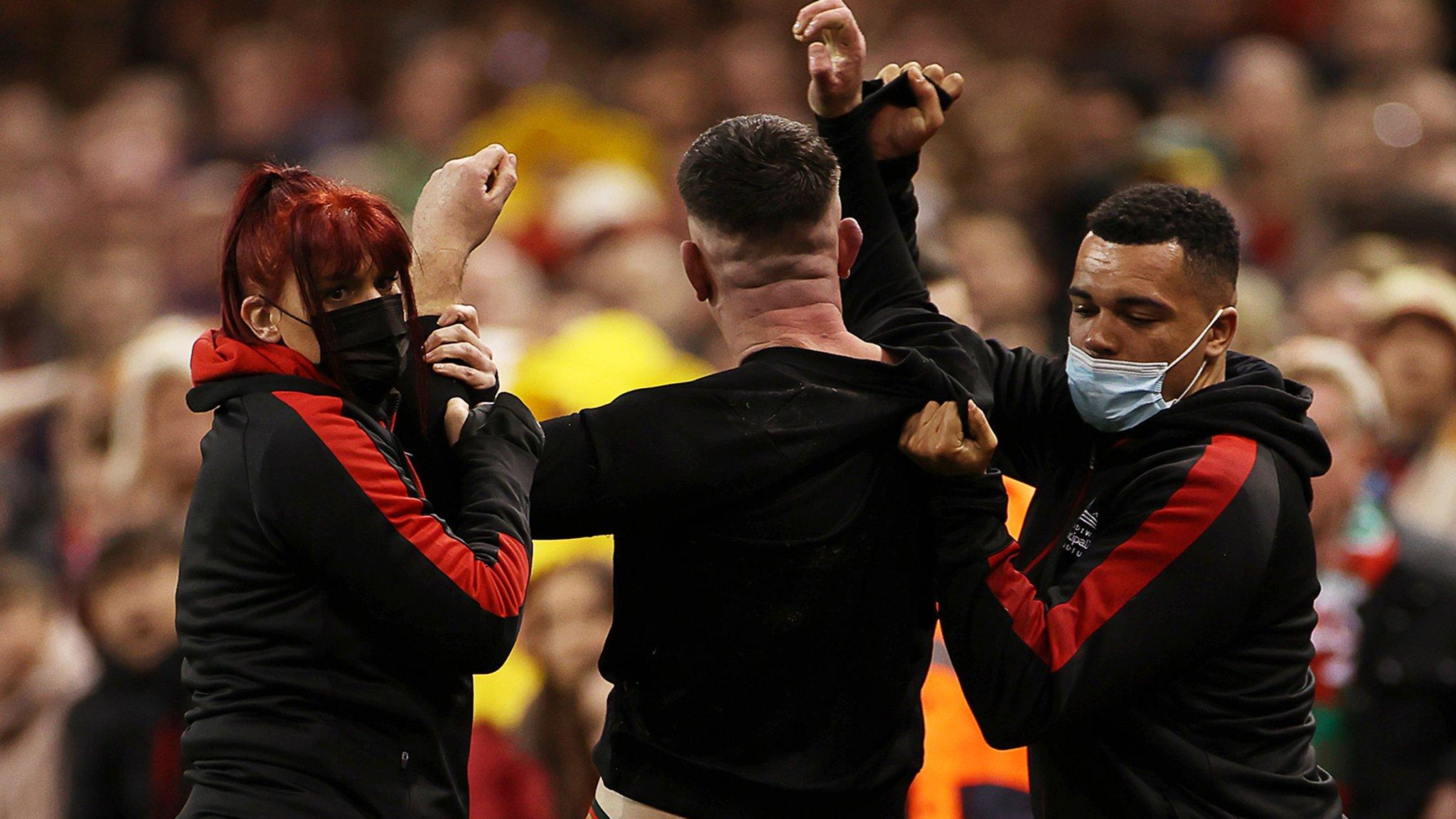
- Published29 November 2017
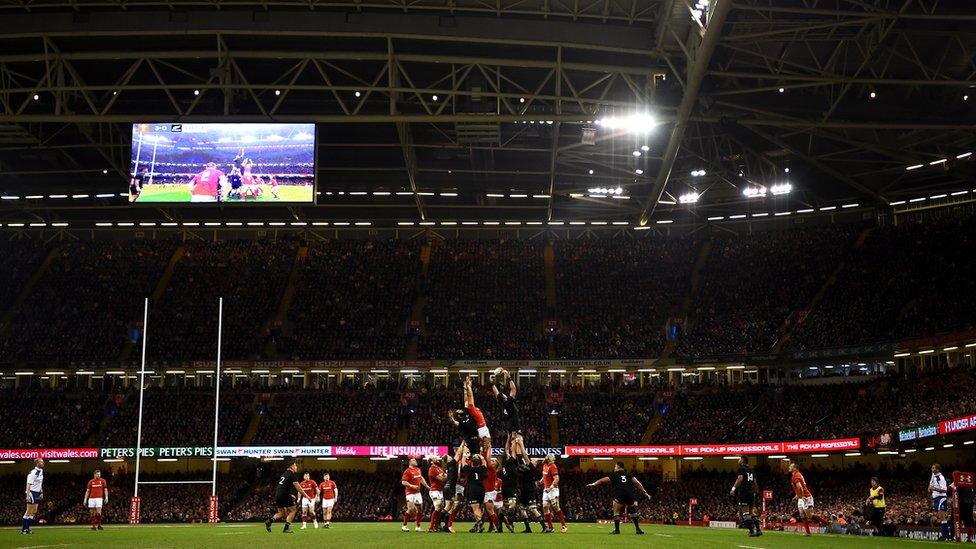
- Attribution
- Published31 October 2018
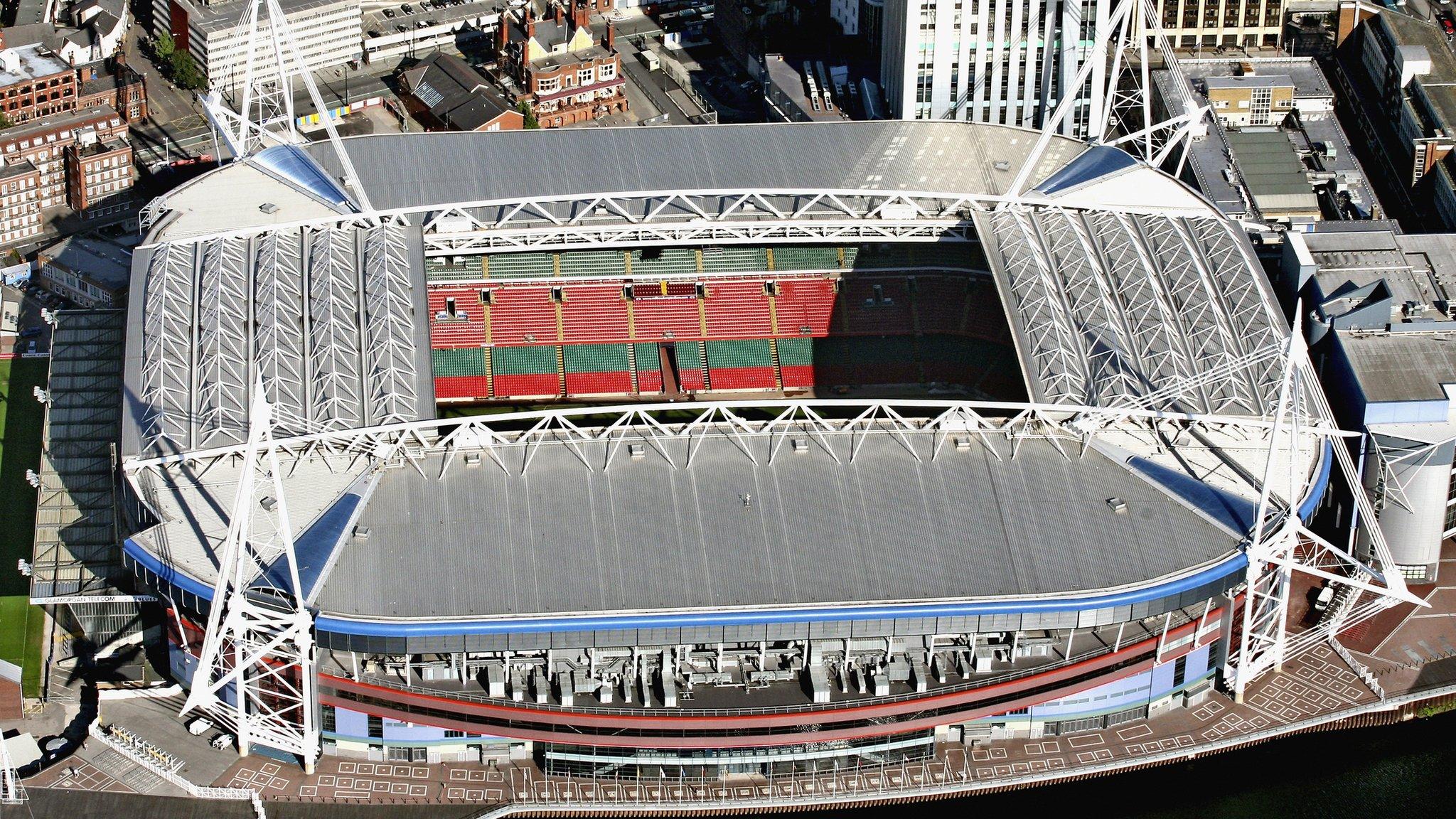
- Attribution
- Published12 November 2021
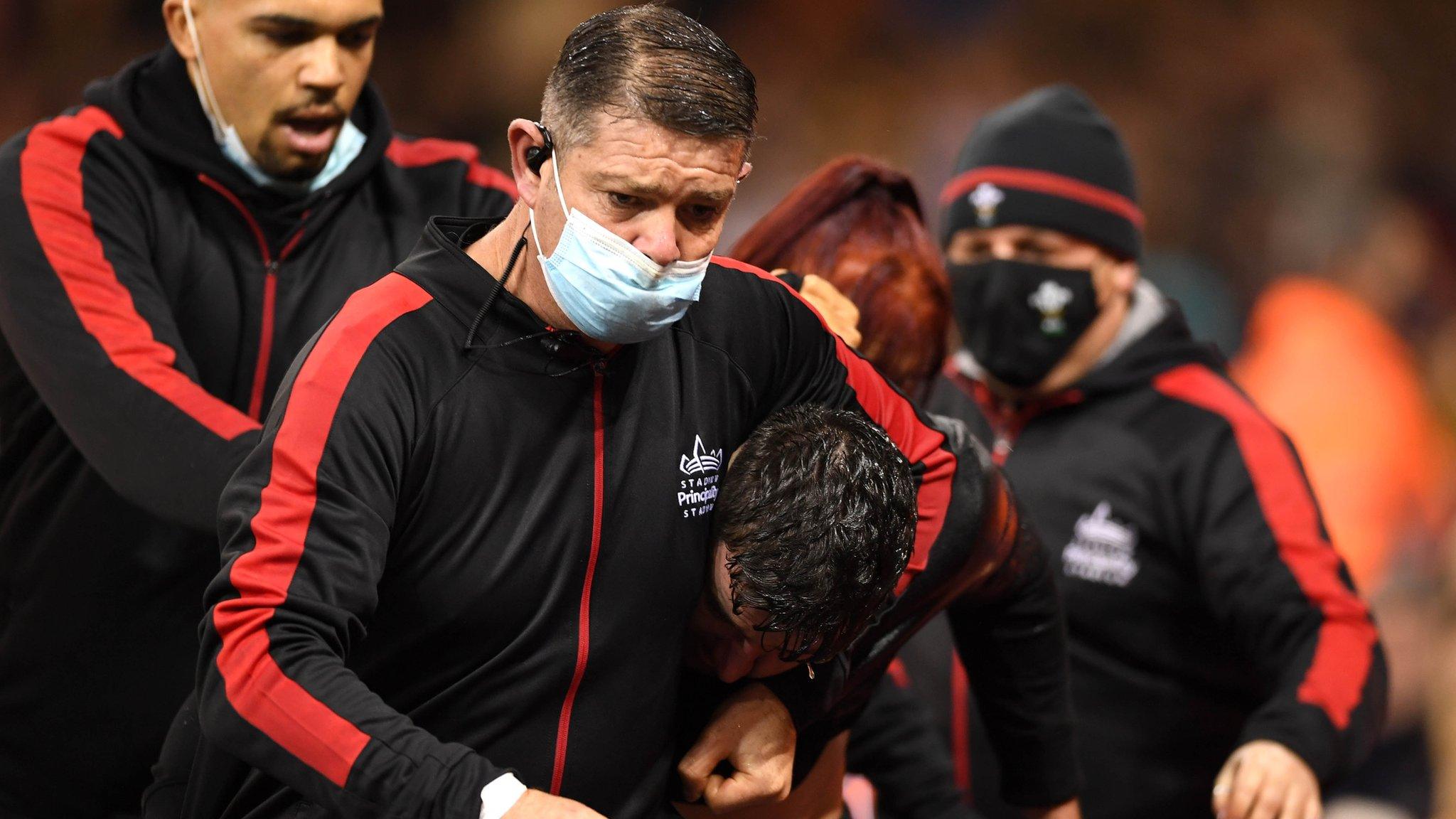
- Published22 November 2021

- Published3 November 2021
